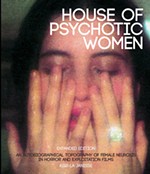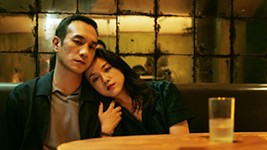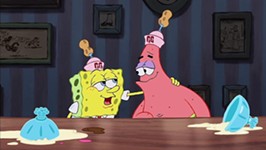Once Upon a War Story
Quentin Tarantino rewrites the spaghetti western with a side of sour Krauts in 'Inglourious Basterds'
By Marjorie Baumgarten, Fri., Aug. 21, 2009

Here's the thing about interviewing Quentin Tarantino: His need to talk about movies is irrepressible. His insatiable hunger dominates the conversation, and his knowledge of and fascination with the work of other filmmakers are as intense and intimate as his reflections on his own career. So when Tarantino says at the outset, "First, let me ask you this: What are a couple of your favorite movies this year?" this interviewer is happy to spend the first 10 minutes of the allotted half-hour conversation simply discussing the movies of 2009 thus far. (For the record, some of his favorites are Funny People, Drag Me to Hell, some sight gags from Land of the Lost, and Jane Campion's new film Bright Star.) Once Tarantino gets going, the only thing that can stop him is the iron fist of an accompanying publicist worried about getting him to his next appointment on time. Our interview location was of Tarantino's choosing: the Texas Chili Parlor, site of the filming of much of Death Proof, his half of Grindhouse. Amid the din of the restaurant, the filmmaker elaborated on his fondness for the place. Turns out that he ate his very first meal in Austin at the Chili Parlor back in 1994 when he came to town to present Pulp Fiction. He's been coming back regularly ever since, and, in a couple of hours, he was about to kick off Cinemapocalypse, an all-night movie marathon at the Alamo Drafthouse with the local premiere of Inglourious Basterds, a World War II fantasia about American GIs hunting Nazis and the power of cinema to bring down the Third Reich. Following are some snippets from our conversation.
Austin Chronicle: Let me start by asking what the intentional misspelling of the title is all about?
Quentin Tarantino: I don't really like to describe it because it was an artistic stroke. To describe it and put it under the microscope, I might as well not have done it. It's a stroke of the brush.
AC: Why did you choose to shoot this film in Germany?
QT: The reason I wanted to shoot in Germany was that the majority of the characters in the movie are German. And I wanted real Germans, especially with as many sets as we built. I could have shot it in Culver City if I wanted to. But then I would have been stuck with whatever Germans I could find or whatever people spoke German, no matter what nationality they were, or flying in everybody. If someone came in and had a one- or two-line part, I wanted them to be German. It's not the same thing in Romania or Bulgaria, where they shoot most of these movies. I wanted the cream of German talent at my disposal. But the wonderful side benefit of all this was that I got to shoot at the old UFA studios. Where we built our cinema set was the same set that Josef von Sternberg shot The Blue Angel, where Marlene Dietrich sat on that little barrel and sang "Falling in Love Again." I was shooting on the same set and soundstages and walking the same streets as Pabst worked on, that Lang shot Metropolis on. Not only that, but all the way to Goebbels-era, films were shot there. Even our production manager's office was Goebbels' old office. We would have big production meetings in Goebbels' old office.
AC: The movie takes that extra effort to get everyone speaking his or her correct language instead of following the Hollywood convention of having everyone speak English.
QT: Even though, from time to time, that's been brought up as a commercial question mark, I actually think the opposite will prove to be one of the strong things about the movie. That thing where it's supposed to be Germany but they're speaking English ... whether they decide to speak with a German accent or they decide to sound like the Old Vic, it's period actors playing the Nazis. I think that's quaint. It seems like an old-fashioned movie. When that happens, you just can't help but feel like the movie was made in 1966 or 1967 or something like that. I don't think people buy it anymore. In particular, young people don't buy it anymore.
AC: What is the backstory of Aldo the Apache [leader of the Basterds, played by Brad Pitt]? He's obviously not Jewish.
QT: No. He's straight hillbilly. If I were going to be strategic, I probably would have made him a Jew. But I just came up with Aldo, and he wasn't. It would have been a lie to make him that. I liked the idea that, on first glance, you would think he's a redneck, that he would be racist. Actually, he's the opposite of racist. He's been fighting racism in the South. He's been fighting the Klan before he ever started fighting Nazis. So it's all one big thing to him. And because he's a big student of history, the reason he wants to lead Jewish soldiers is not just for the greater glory of Jews but because he knows he can take these guys and turn it into a holy war. Using this Apache-resistance idea will have even much more psychological resonance with the Nazis. The Basterds ambush seven guys. Some of those guys they kill – they ambush them, desecrate the bodies, and leave them there to find. It's not so much about those seven guys but, rather, getting into the psyches of the hundred German soldiers who will be talking about those seven guys. And the fact that it's Jews doing it is one of the big psychological advantages that they have.
AC: The Holocaust is so sacrosanct; you're treading into some tricky territory with the historical leaps you make in this movie.
QT: Doing research, I found it was not uncommon for American soldiers to capture Germans and interrogate them the way Aldo did and say: "Look, here's the deal. If you don't tell us what we want to know, we're going to give you to our Jew. You don't want that. We give you to our Jew, it's going to be bad. You're gonna want to talk to me."
AC: Talk to me some about the spaghetti western aspect of Inglourious Basterds, which mostly appears through the music.
QT: I liked the idea that the film would play like a spaghetti western but using World War II iconography as opposed to cowboy iconography. The other thing is that when people think of spaghetti westerns, they often think about the music or the costumes or the stylization. I've always thought about the world the spaghetti western takes place in: the world and the landscape. It's a brutal landscape. In a Purple Rose of Cairo situation, you would not want to be transported into a spaghetti western. Life is cheap; death is just around the corner; it's boom, and you're dead. And the banditos laugh as they do it. That's a pretty good approximation of what life was like in Europe under the occupation. Boom and you're dead in the ditch.
AC: So many Holocaust movies start with "based on a true story," whereas yours starts with the exact opposite, "Once upon a time in Nazi-occupied France," making it clear that this is a fantasy. Why structure it in five chapters instead of conventionally cross-cutting?
QT: Well, most of my movies actually have a chapter structure. I like telling stories that way; it's a very novelistic way to do it. None of my movies – Death Proof was an exception, but none of my other movies – ended with a big climax. I lead you to think that you're going to have a big climax, then kind of undercut it. Hopefully, it's satisfying even though it's not the big climax you were expecting. But here, this is an adventure story. I have to give you the big climax. I don't want it to be an art-film meditation on an adventure story; I want it to deliver the goods. So this required something different. I actually had to have a couple more exposition scenes than I normally have. I usually abhor them. But it's an adventure story; you have to know what's going on.
AC: In addition to the action, the film's verbal play is its own kind of weaponry. It strikes me that you're using language a little differently in this movie.
QT: A case could be made that language is one of the things that the movie is about. But that's also the war. When the Germans said "Move," if you didn't know what "move" meant, you could be dead.
Inglourious Basterds opens in Austin on Friday. See Film Listings for review.












